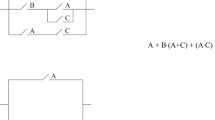Abstract
I discuss the prospects of perspectival realism for resolving the problem of incompatible models or theories in scientific practice. My diagnosis is that the perspectivist can secure the ‘realism’ in her position only by employing suitable relations between the models. It is such relations that do the work, not the general philosophical claim about the perspectival nature of knowledge claims. But appeal to such relations has also been the preferred strategy of scientific realist approaches to the problem. With respect to the problem of incompatible models, then, it is not clear that perspectivism has a clear advantage—even though the issue was among the motivating problems for proposing this view. I suggest, however, that the required inter-model relations (typically limit relations) embody a narrower notion of perspective, a notion that is explicitly part of the models themselves and that is essential in maintaining a realist view.
Similar content being viewed by others
Notes
For the most part I will not distinguish between models and theories so as to be able to use the phrase ‘is true’ without having to specify that this means, in the case of models, that the claim ‘the model agrees with the target in appropriate respects’ is true.
Cf. also Morrison (2015), ch. 5, where some further remarks are added to the discussion in her 2011.
A similar concern arises for Teller’s characterization of a ‘pluralist ontology’: “The project of getting our ontology ‘right’ was predicated on presuming that some of our accounts are, exactly speaking, true, or at least that they can be ordered as to closeness … to the truth. […] When we give up this presumption we see that we can embrace ‘conflicting’ ontologies, being careful not to invoke them ‘at the same time’, or, more carefully, not to take them to represent the same aspects of the not completely accurately represented objects of our representations. Thus we may take a pluralist ontology to consist of a collection of idealized descriptions that, when deployed with care in cognizance of their limitations, can be consistently applied as complementary rather than conflicting.” (2004, 441).
Cf. also Giere (2006), 93f.
As I suggested in 2005.
Since the advance online publication of this article does not contain page numbers, I refer to the numbering in the version posted on Massimi’s website.
For Massimi, scientific perspectives refer to the actual scientific practices of actual scientific communities at a given time, where such practices consist of (1) scientific knowledge claims, (2) the communities’ resources for reliably generating such claims, and (3) the second-order claims that justify the knowledge claims (2016, 2).
I am considering here only the case of synchronic evaluations, i.e., evaluations from rival perspectives at the same time. The case of diachronic evaluations—from perspectives that follow later in history of science—is more removed from the way the problem of incompatible models is typically understood.
I replace ‘water is a liquid with viscosity’ by ‘W’ in all quotes, even though Massimi does not use this abbreviation.
The locus classicus is Batterman (2002).
Cf., e.g, Wolf-Gladrow (2000).
I take it that Morrison has something like this in mind when she mentions cases in which “the scientific context itself embodies a form of perspectivism” (2015, 161).
Note also that for perspectives in the narrow sense, we can point to a precise reason of why they are needed in scientific models: perspectival representations are required not because the real world is ‘too complex’ in a vague sense to be captured in non-perspectival models but rather because the systems we want to represent contain processes and features at widely different scales.
Morrison (2011, 350) calls this response a “re-branded version of instrumentalism”.
References
Batterman R (2002) The devil in the details. Oxford University Press, New York
Giere R (2006) Scientific perspectivism. University of Chicago Press, Chicago
Giere R (2009) Scientific perspectivism: behind the stage door. Stud Hist Philos Sci 40:221–223
Golse F (2005) The Boltzmann equation and its hydrodynamic limits. Handbook of differential equations: evolutionary equations, vol 2. Elsevier, Amsterdam, pp 161–301
Massimi M (2012) Scientific perspectivism and its foes. Philosophica 84:25–52
Massimi M (2016) Four kinds of perspectival truth. Philos Phenomenol Res. doi:10.1111/phpr.12300
Morrison M (2011) One phenomenon, many models: inconsistency and complementarity. Stud Hist Philos Sci 42:342–351
Morrison M (2015) Reconstructing reality. Oxford University Press, New York
Psillos S (1999) Scientific realism. Routledge, London
Rueger A (2005) Perspectival models and theory unification. Br J Philos Sci 56:579–594
Rueger A (2014) Perspectives and idealizations. Synthese 191:1831–1845
Teller P (2004) How we dapple the world. Philos Sci 71:425–447
Wolf-Gladrow D (2000) Lattice gas cellular automata and Lattice Boltzmann models. Springer, New York
Author information
Authors and Affiliations
Corresponding author
Rights and permissions
About this article
Cite this article
Rueger, A. Perspectival Realism and Incompatible Models. Axiomathes 26, 401–410 (2016). https://doi.org/10.1007/s10516-016-9317-z
Received:
Accepted:
Published:
Issue Date:
DOI: https://doi.org/10.1007/s10516-016-9317-z



